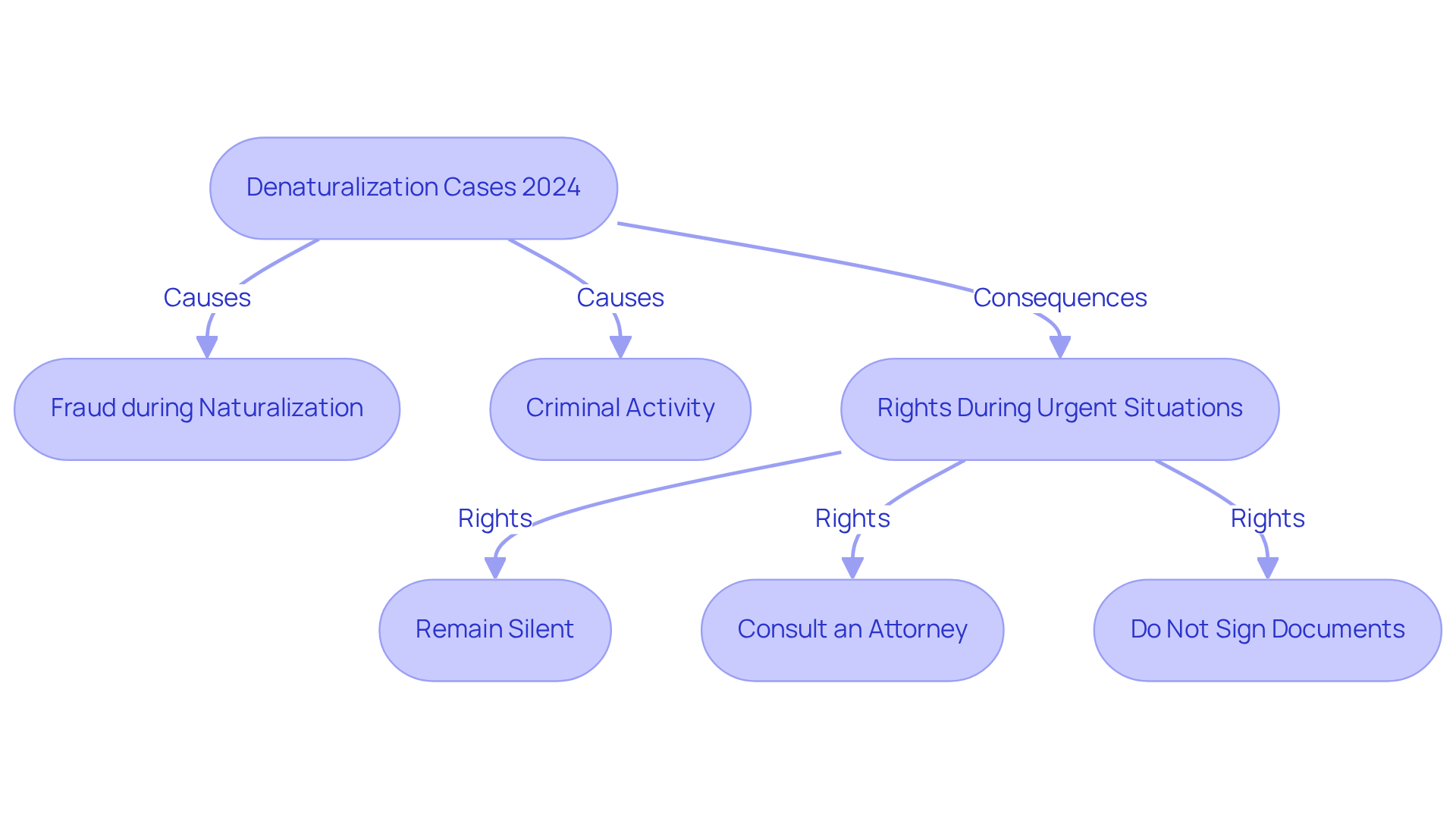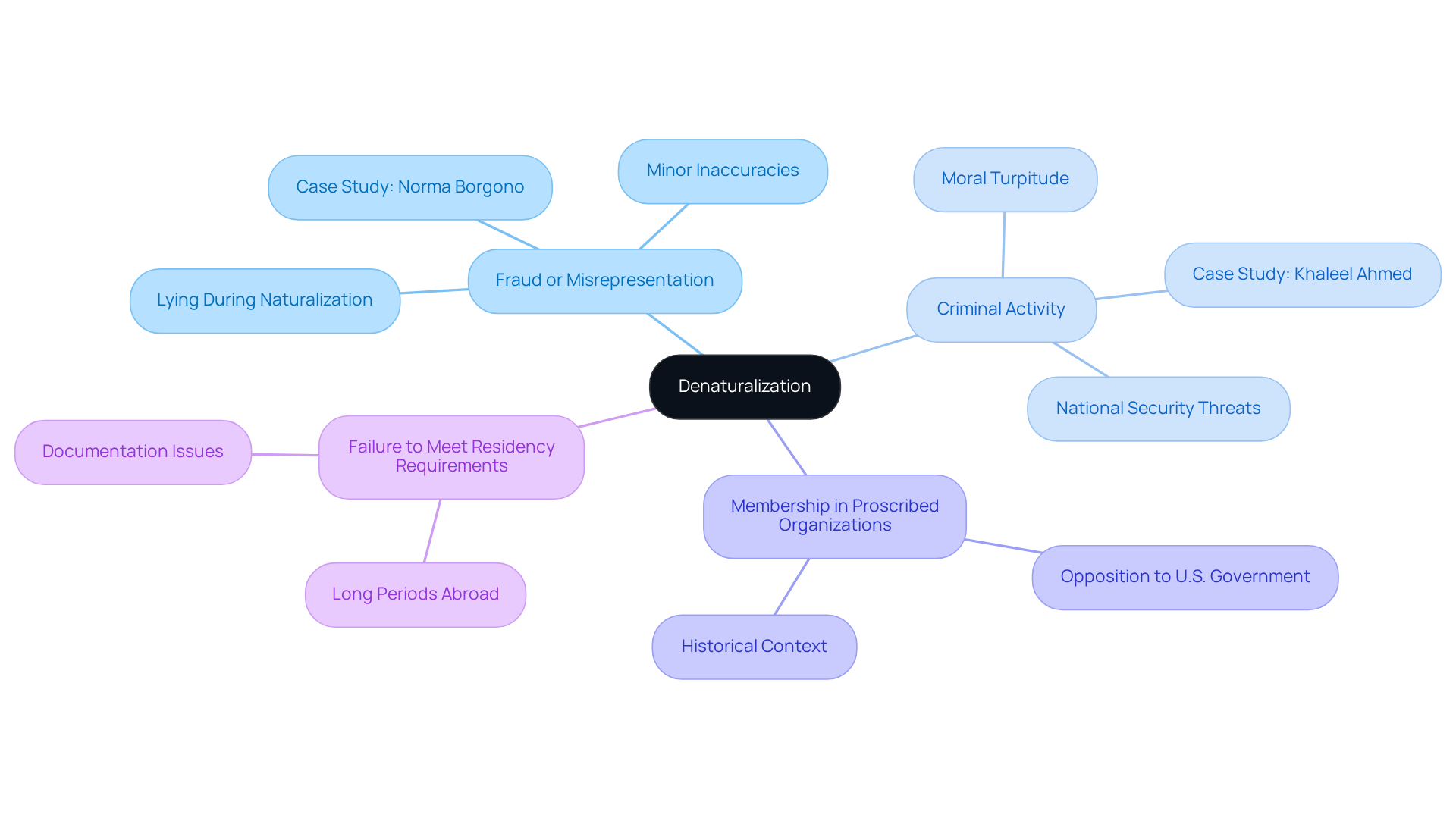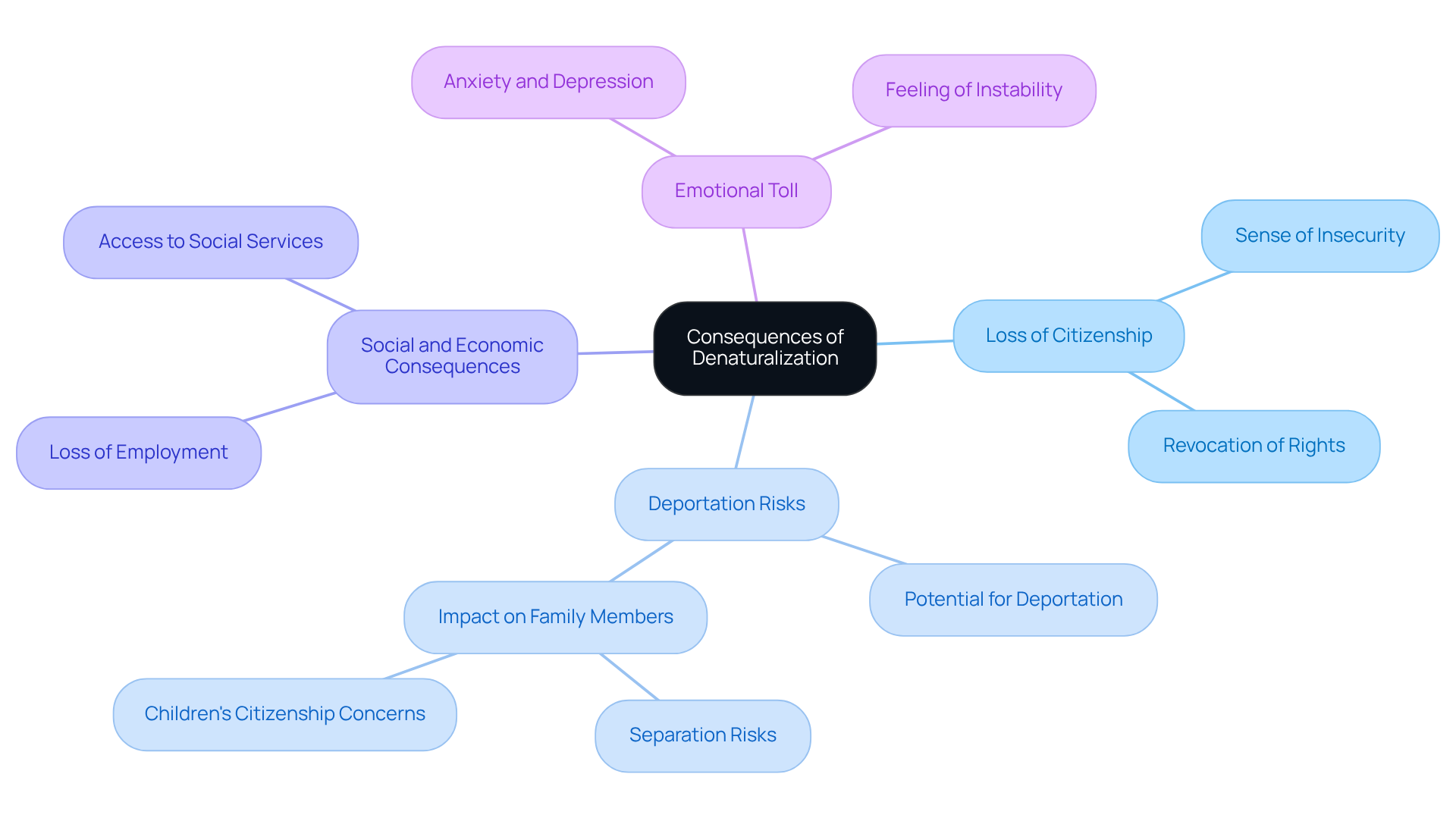Overview
The article highlights the crucial steps and implications of denaturalization cases in 2024. It details how the U.S. government can revoke the citizenship of naturalized citizens under specific circumstances, such as fraud or criminal activity. This isn’t just a legal process; it’s a serious matter that can lead to loss of citizenship, potential deportation, and significant emotional distress for individuals and families.
Understanding the legal processes involved is vital, especially as the Department of Justice prioritizes heightened enforcement. Have you ever felt overwhelmed by the complexities of immigration laws? It’s important to know that you’re not alone in this fight. We’re here to support you every step of the way.
The impacts of denaturalization extend beyond legalities; they touch the very fabric of families and communities. Your future matters to us, and we’re committed to fighting for your rights. Let’s navigate this together—because you deserve clarity in moments of crisis.
Introduction
Denaturalization is a critical issue that has surfaced as a central concern in U.S. immigration law, particularly as the government heightens scrutiny of naturalized citizens. The stakes are incredibly high; the potential loss of citizenship can lead to severe consequences, including deportation and significant disruptions to family life.
Have you ever wondered what happens when the very rights you believed were secure can suddenly be questioned? This article explores the essential steps and implications of denaturalization cases in 2024, offering vital insights for those navigating this complex and often daunting landscape.
We’re here to fight for your family.
Define Denaturalization: Key Concepts and Implications
Denaturalization cases 2024 highlight the critical process where the U.S. government can withdraw the citizenship of a naturalized citizen. This can happen under specific circumstances, such as:
- Fraud during the naturalization process
- Criminal activity
Understanding denaturalization cases 2024 is vital for naturalized citizens, as it can lead to severe consequences, including loss of privileges and potential deportation. Have you ever felt uncertain about your rights in such situations? In urgent moments—like receiving a subpoena or facing ICE enforcement—immediate action is crucial. You have the right to:
- Remain silent
- Consult an attorney
- Not sign documents without professional guidance
It’s essential to exercise these rights and seek help quickly. The effects of denaturalization cases 2024 ripple beyond the individual, impacting families and communities, making it a significant concern in immigration law. If you find yourself in a crisis, remember: don’t hesitate to seek urgent assistance. We’re here to fight for your family.

Explore Legal Grounds for Denaturalization: Reasons and Processes
Denaturalization can happen for several legal reasons, primarily outlined in the Immigration and Nationality Act (INA). Here are the key grounds:
-
Fraud or Misrepresentation: If someone is found to have lied or concealed information during the naturalization process, their citizenship may be revoked. Even minor inaccuracies can be significant enough to affect the naturalization decision.
-
Criminal Activity: Certain criminal convictions, especially those involving moral turpitude or national security threats, can lead to loss of citizenship. The Department of Justice (DOJ) prioritizes serious crimes in its enforcement strategy, reflecting a commitment to national security.
-
Membership in Proscribed Organizations: Joining organizations that oppose the U.S. government can result in citizenship loss. This has historical roots, as denaturalization cases 2024 have been used as a political tool in the past.
-
Failure to Meet Residency Requirements: Naturalized citizens must maintain residency in the U.S. Failing to do so, particularly after long periods abroad without proper documentation, can lead to revocation.
Understanding these potential reasons for denaturalization is crucial. If you receive a subpoena or face immigration enforcement, such as ICE actions or deportation proceedings, know your rights. You have the privilege to remain silent, the right to an attorney, and the right not to sign documents without professional advice. DO NOT open your door unless ICE has a warrant signed by a judge. Immediate action is essential; utilize your right to remain silent and request a lawyer without delay. Contact us 24/7 for emergency defense. Our emergency line is here for urgent legal matters. Don't wait—your rights and freedom may depend on immediate action. 🔥 CALL NOW: 1-844-967-3536.
The process of revoking citizenship typically starts with an investigation by U.S. Citizenship and Immigration Services (USCIS), which may identify cases for further scrutiny. Following this, a suggestion for revocation is made to the DOJ, which has recently expanded its criteria for pursuing denaturalization cases 2024, raising concerns about arbitrary enforcement. For example, the DOJ has filed civil revocation complaints against individuals who allegedly gained citizenship through fraudulent means, indicating a growing focus in this area. As of 2025, the DOJ's renewed emphasis on denaturalization cases 2024 reflects a significant shift in immigration enforcement priorities, impacting many naturalized citizens and their families.

Understand Denaturalization Proceedings: Steps and Legal Processes
Denaturalization proceedings can be daunting, but understanding the structured legal process can empower you. Here’s what to expect:
-
Investigation: The journey often begins with an investigation by USCIS or the DOJ. They will scrutinize your immigration history and any related criminal records. This scrutiny has intensified, as the DOJ now prioritizes denaturalization cases in 2024 as a public safety issue. Since early 2025, there has been a notable increase in cases filed.
-
Filing of Complaint: If enough evidence is found, the DOJ will file a civil complaint in federal court, formally starting the legal proceedings. This step is crucial; it sets the stage for what comes next.
-
Court Hearing: A hearing will be scheduled where both the government and you can present your cases. The burden of proof lies with the government, which must provide clear and convincing evidence to justify the revocation of your citizenship. Recent cases, like those of Gurdev Singh Sohal and Hector Daneri Regalado, highlight the serious consequences of misrepresentation during the naturalization process. Remember, you have the right to remain silent and should not answer questions without your attorney present.
-
Judicial Decision: After reviewing the evidence, the court will issue a ruling. If citizenship is revoked, you may lose your nationality and face deportation proceedings. Importantly, civil denaturalization cases have no statute of limitations, meaning the government can pursue cases regardless of when the alleged misrepresentation took place.
-
Appeal Process: You have the right to appeal the court's decision, which can prolong the proceedings. While this offers additional chances for defense, it can also extend the uncertainty surrounding your immigration status. If you find yourself in urgent need of support, remember that you can reach out to us 24/7 for emergency defense.
Understanding these steps is vital for anyone facing citizenship revocation, especially in a changing legal landscape with heightened enforcement measures by the DOJ. We’re here to fight for your family, ensuring you feel supported and informed every step of the way.

Assess Consequences of Denaturalization: Impact on Individuals and Families
The consequences of denaturalization can be severe and far-reaching:
-
Loss of Citizenship: The most immediate effect is the revocation of U.S. citizenship, stripping individuals of their rights and privileges as citizens. This loss can create a profound sense of insecurity and fear among naturalized citizens, particularly those who have built their lives in the U.S.
-
Deportation Risks: Denaturalized persons may face deportation, which can be particularly distressing if they have established roots in the U.S. The potential for deportation not only affects the individual but also poses significant risks for family members, especially children who may be U.S. citizens.
-
Impact on Family Members: Families may experience separation, with the legal status of family members jeopardized. Approximately 20 million naturalized Americans are now concerned that any errors in their immigration paperwork could lead to denaturalization cases in 2024, creating a climate of fear that can deter participation in democratic processes.
-
Social and Economic Consequences: Denaturalization can lead to the loss of employment, housing, and access to social services, resulting in considerable difficulties for people and their families. The emotional toll of such losses can exacerbate existing vulnerabilities, particularly for those who rely on social services for support.
-
Emotional Toll: The psychological effect of losing citizenship and confronting possible deportation can result in anxiety, depression, and a feeling of instability for individuals and their families. The fear of losing citizenship can deter naturalized citizens from fully engaging in their communities, undermining the essence of citizenship itself.
In summary, the consequences of revocation of citizenship extend beyond the individual, impacting families and communities, and raising critical questions about the rights and protections granted to naturalized citizens. The situation of Elliott Duke, a U.K. Army veteran who encountered loss of citizenship due to undisclosed criminal history, exemplifies the real-world consequences of such policies. As Assistant Attorney General Brett Shumate noted, denaturalization cases in 2024 are a top priority for the DOJ, emphasizing the serious implications for those affected.

Conclusion
Understanding the complexities surrounding denaturalization cases in 2024 is essential for naturalized citizens. The ability of the U.S. government to revoke citizenship under specific circumstances poses significant risks, including loss of rights, potential deportation, and severe emotional and social consequences. This article has illuminated the critical nature of these proceedings, emphasizing the importance of being informed and prepared.
Key points discussed include the legal grounds for denaturalization, such as:
- Fraud
- Criminal activity
- Failure to meet residency requirements
The structured process of denaturalization, from investigation to judicial decision, highlights the urgency of seeking legal counsel when faced with such challenges. Furthermore, the far-reaching impacts of denaturalization on individuals and families underscore the gravity of the situation, as many may find themselves facing deportation and separation from loved ones.
The implications of denaturalization extend beyond individual cases, affecting entire communities and raising vital questions about the rights of naturalized citizens. As the landscape of immigration law continues to evolve, it is crucial for those at risk to remain vigilant and proactive in protecting their rights. Engaging with legal resources and understanding the denaturalization process can make a significant difference in navigating these turbulent waters.
We’re here to fight for your family. Your future matters to us. Yo Peleo — We Fight.
Frequently Asked Questions
What is denaturalization?
Denaturalization is the process by which the U.S. government can withdraw the citizenship of a naturalized citizen under specific circumstances.
What circumstances can lead to denaturalization?
Denaturalization can occur due to fraud during the naturalization process or criminal activity.
Why is it important for naturalized citizens to understand denaturalization cases?
Understanding denaturalization is vital as it can lead to severe consequences, including loss of privileges and potential deportation.
What rights do individuals have when facing denaturalization or related legal issues?
Individuals have the right to remain silent, consult an attorney, and not sign documents without professional guidance.
How can denaturalization cases impact families and communities?
The effects of denaturalization can ripple beyond the individual, affecting families and communities, making it a significant concern in immigration law.
What should someone do if they find themselves in a crisis related to denaturalization?
In a crisis, it is crucial to seek urgent assistance and legal help promptly.




